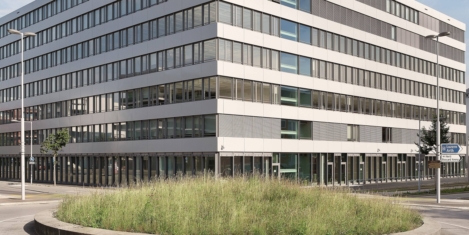December 6, 2018
Siemens new Swiss campus showcases workplace technology and use of BIM in construction
 Siemens AG has officially opened its new campus in Zug, Switzerland. The Siemens Zug campus features a new office building with 1,000 work spaces and a newly constructed production building. The investment volume for new buildings, renovations and related measures amounts to CHF 250 million. The campus is the international headquarters of the Siemens Building Technologies (BT) Division, which has 29,000 employees. Construction of the office and production buildings began in May 2016 and was completed in July 2018. The Siemens Zug campus is one of the first new projects to use Building Information Modeling (BIM) for design and construction. The digital twin – a 3D model of the building, enhanced with technical information relevant for later operations – is the foundation for efficient, cost-optimised and forward-looking building management. (more…)
Siemens AG has officially opened its new campus in Zug, Switzerland. The Siemens Zug campus features a new office building with 1,000 work spaces and a newly constructed production building. The investment volume for new buildings, renovations and related measures amounts to CHF 250 million. The campus is the international headquarters of the Siemens Building Technologies (BT) Division, which has 29,000 employees. Construction of the office and production buildings began in May 2016 and was completed in July 2018. The Siemens Zug campus is one of the first new projects to use Building Information Modeling (BIM) for design and construction. The digital twin – a 3D model of the building, enhanced with technical information relevant for later operations – is the foundation for efficient, cost-optimised and forward-looking building management. (more…)






 Well over half of workers do not think enough support is given to employees suffering from mental ill health in the workplace, as according to research released today by Personal Group a startling 39 percent of respondents said their workplace does not offer any mental health support for employees. And of all employees surveyed 66 percent felt their employer does not offer enough support for employee mental health. This corporate apathy felt by employees arrives at a time when awareness of mental health issues in the UK is on the rise. 80 percent of respondents said they had noticed an overall increase in awareness of mental health generally in the UK, however a staggering 62 percent said they noticed no change in the levels of awareness in the workplace.
Well over half of workers do not think enough support is given to employees suffering from mental ill health in the workplace, as according to research released today by Personal Group a startling 39 percent of respondents said their workplace does not offer any mental health support for employees. And of all employees surveyed 66 percent felt their employer does not offer enough support for employee mental health. This corporate apathy felt by employees arrives at a time when awareness of mental health issues in the UK is on the rise. 80 percent of respondents said they had noticed an overall increase in awareness of mental health generally in the UK, however a staggering 62 percent said they noticed no change in the levels of awareness in the workplace.
 One year on from #MeToo – just one in four workers agree that international media coverage has helped to improve their workplace culture, according to new research on sexual harassment from Acas. The workplace experts commissioned the study from YouGov to find out whether media reporting on #MeToo and high-profile celebrity cases have had any effect on British workplaces. Only a third (30 percent) of survey respondents believe that incidents of sexual harassment in workplaces have decreased in the last five years.
One year on from #MeToo – just one in four workers agree that international media coverage has helped to improve their workplace culture, according to new research on sexual harassment from Acas. The workplace experts commissioned the study from YouGov to find out whether media reporting on #MeToo and high-profile celebrity cases have had any effect on British workplaces. Only a third (30 percent) of survey respondents believe that incidents of sexual harassment in workplaces have decreased in the last five years. 




 More than half of CEOs (53 percent) admit they can’t find candidates with the necessary skills to help them navigate an increasingly digitalised business landscape a new survey from Robert Half has claimed. These include data analysis and digital skills, as well as softer skills such as resilience, adaptability to change and critical thinking. This means that nearly five million UK SMEs, the equivalent to four out of every five (82 percent) small and medium-sized companies, are struggling to attract the skills they need. As a result, many are being forced to offer salary packages higher than originally expected to recruit the right talent.
More than half of CEOs (53 percent) admit they can’t find candidates with the necessary skills to help them navigate an increasingly digitalised business landscape a new survey from Robert Half has claimed. These include data analysis and digital skills, as well as softer skills such as resilience, adaptability to change and critical thinking. This means that nearly five million UK SMEs, the equivalent to four out of every five (82 percent) small and medium-sized companies, are struggling to attract the skills they need. As a result, many are being forced to offer salary packages higher than originally expected to recruit the right talent. 

















September 6, 2018
Creating a productive workplace for people is all about context
by Mark Eltringham • Comment, Facilities management, Workplace, Workplace design
(more…)